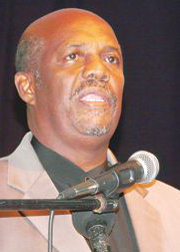
KINGSTOWN, St. Vincent – As speculation continues about the possible implementation of market-based property taxes here next year, Opposition Leader Arnhim Eustace warned on Monday that this can lead to increased hardships for Vincentians.
Eustace, reading from the press release on the latest International Monetary Fund (IMF) Article IV consultation with the government, noted that the IMF spoke of the government’s plan to change the property tax regime here.
Gonsalves had spoken of this change in his budget address in January, but said the legal framework was not yet in place for such a move.
IMF directors, according to the Nov. 23 release, “welcomed” the Unity Labour Party government’s “plans to introduce market based property taxes, strengthen revenue administration, contain the public sector wage bill, limit transfers to state owned enterprises, and rationalize spending on goods and services”.
“What they (IMF directors) are saying to you, based on their discussion with government, they plan (the government), in the next budget — which is due in January sometime – [are] going to introduce market-based property taxes,” Eustace said.
He said that over the past few years the government has been re-evaluating all the properties in the country.
“Up to now, you pay property tax on basis of the rental value of a building. … So, depending on what percentage they put on here, you can have a very large increase in the amount of money that you have to pay for your property tax,” he said.
“So, you see, the language is very important,” he said in making the point that the context, and not just the content, of the IMF release is important.
Eustace said that when market-based property taxes were in Barbados, his taxes on a property there went from BDS$1,500 to $6,000 but he negotiated it down to $4,500
“So, a lot depends now on how this is implemented. You have to watch very carefully what percentage you put on there on the value, because it can come very high,” Eustace said.
“It will bring in a lot of revenue but it bring a lot of hardship on people,” the former finance minister said.
He said that while he does not know what percentage the government is considering, “the difference can be very significant depending on what figure they put there.
“So, they (the IMF) welcome their (the government’s) plan to introduce it but they didn’t say what it is, how much it would be.
Eustace spoke of other possible impact of a change in the property tax regime.
“[P]eople who are struggling with their mortgage now have to pay these additional taxes on top of what they are paying on their mortgage. And some of them don’t have the room in terms of the amount of money they have after they pay for food and electricity.
“… We have to watch this very carefully. In addition to that, people who are in fact renting properties, will now pay higher property tax and the rent will go up,” he said.
“So it is very easy to write a sentence ‘they welcome their plans to introduce market based property taxes’. But it has a lot of implications and those implications mean that you, the consumer, you, the citizen, have to put out more money out of your pocket when things are already tight,” Eustace said.





